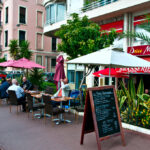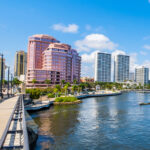France, one of the most popular tourist destinations in the world, is renowned for its rich history, diverse culture, exquisite cuisine, and stunning landscapes. While the country is often associated with luxury and opulence, it is entirely possible to explore and enjoy France on a budget. In this comprehensive travel guide, we will provide valuable tips and insights on how to experience the best of France without breaking the bank.
I. When to Visit France
The best time to visit France on a budget is during the shoulder seasons of spring (April to June) and fall (September to November). During these periods, the weather is generally pleasant, and there are fewer tourists, resulting in lower prices for accommodations and attractions. The peak summer season (July and August) sees a significant influx of tourists, causing prices to skyrocket, while the winter months (December to February) may be too cold for some outdoor activities, except for skiing in the French Alps.
II. Getting to and Around France
A. Arriving in France
By Air: France has several international airports, with Charles de Gaulle Airport (CDG) in Paris being the busiest. Budget airlines often operate flights to French airports, providing affordable options for reaching the country.
By Train: France is well-connected to other European countries by an extensive rail network. Booking train tickets in advance and opting for regional or slower trains can help secure budget-friendly fares.
B. Public Transportation
Trains: France’s national railway company, SNCF, offers a range of train services, including high-speed TGV trains, intercity trains, and regional TER trains. To travel on a budget, opt for slower, regional trains, and book tickets well in advance to secure the best deals.
Buses: Intercity buses operated by companies such as FlixBus, Ouibus, and Eurolines offer an even more affordable alternative to trains for traveling between cities and regions in France.
Carpooling: Carpooling platforms like BlaBlaCar connect drivers with travelers heading in the same direction, providing a cost-effective and environmentally friendly way to travel within France.
City Public Transportation: Most French cities have efficient and affordable public transportation systems, including buses, trams, and metro services. Consider purchasing daily or weekly passes for unlimited travel and better value.
III. Affordable Accommodation
Budget travelers can find a range of affordable accommodations in France, from hostels and budget hotels to vacation rentals and campgrounds.
Hostels: France has a wide variety of hostels, offering dormitory-style and private rooms at budget-friendly prices. Hostels often provide shared kitchen facilities, helping to reduce food costs.
Budget Hotels: Budget hotel chains such as ibis Budget, Première Classe, and B&B Hôtels offer basic yet comfortable accommodations at reasonable prices.
Airbnb and Vacation Rentals: These platforms provide a range of affordable accommodations, including private rooms and apartments. Staying in an Airbnb or vacation rental also allows access to kitchen facilities, reducing food costs.
Campgrounds: Camping is a popular and budget-friendly way to explore France, particularly in rural areas and near national parks. Campsites offer various facilities and price points, from basic tent pitches to well-equipped mobile homes.
IV. Sightseeing and Activities on a Budget
A. Free Attractions
Many of France’s attractions, such as parks, gardens, and historic neighborhoods, can be enjoyed for free. Additionally, some museums and monuments offer free entry on specific days or for certain age groups.
Paris: Stroll along the Seine River, explore the historic neighborhoods of Montmartre and Le Marais, and visit iconic landmarks such as Notre-Dame Cathedral and
the Sacré-Cœur Basilica, all without spending a dime. Moreover, the first Sunday of each month offers free access to many of Paris’s museums, including the Louvre and the Musée d’Orsay.
Lyon: Discover the city’s rich history by wandering through the narrow streets of Vieux Lyon, visiting the ancient Roman amphitheater, and admiring the Basilica of Notre-Dame de Fourvière. Many of Lyon’s parks and gardens, such as Parc de la Tête d’Or and Jardin des Curiosités, are also free to explore.
Nice: Stroll along the famous Promenade des Anglais, relax on the pebble beaches, or hike up Castle Hill for panoramic views of the city and the Mediterranean Sea.
Bordeaux: Enjoy the city’s stunning architecture and vibrant atmosphere by wandering through the historic center, visiting Place de la Bourse, and exploring the banks of the Garonne River.
B. Budget-friendly Attractions and Activities
Paris Museum Pass: This pass offers unlimited access to over 60 museums and monuments in Paris and the surrounding region, including the Louvre, Musée d’Orsay, and the Palace of Versailles. Opt for a 2-, 4-, or 6-day pass to maximize savings based on the length of your stay.
Cycling: Many French cities, including Paris, Lyon, and Nice, have affordable bike-sharing programs, such as Vélib’ and Vélo’v. Cycling is not only an economical way to explore but also allows for a more immersive experience.
Wine Tasting: France is renowned for its wine regions, such as Bordeaux, Burgundy, and Champagne. Look for local vineyards and wineries offering budget-friendly tastings and tours, or consider visiting during regional wine festivals for special deals and events.
City Cards: Many French cities offer tourist cards, providing discounts or free entry to numerous attractions, public transportation, and guided tours. Consider purchasing a city card to save on sightseeing and activities during your visit.
V. Eating and Drinking on a Budget
A. Affordable Dining Options
Boulangeries and Patisseries: French bakeries offer a range of budget-friendly options, such as sandwiches, quiches, pastries, and fresh bread. Grab a baguette and some cheese for an impromptu picnic in a park.
Crêperies: Crêpes, both sweet and savory, are a delicious and affordable meal option in France. Look for crêpe stands and small crêperies for the best deals.
Street Food: France has a growing street food scene, offering budget-friendly fare such as falafel, pizza, and kebabs.
Supermarkets and Markets: Shopping at supermarkets and local markets is an economical way to enjoy French cuisine. Purchase fresh produce, cheese, and charcuterie for a self-catered meal or picnic.
B. Budget Drinking Options
Happy Hours: Many bars and restaurants in France offer happy hour deals, typically between 5 PM and 8 PM, with discounted drinks and appetizers.
Wine Shops and Supermarkets: Purchasing wine, beer, or liquor from wine shops and supermarkets is a budget-friendly way to enjoy a drink in your accommodation or at a park or beach.
VI. Shopping on a Budget
Flea Markets: France is famous for its flea markets (marchés aux puces), where you can find unique and affordable items, including antiques, vintage clothing, and souvenirs. The largest and most famous flea market in France is the Marché aux Puces de Saint-Ouen in Paris.
Discount Shops:
Discount Shops: France has a variety of discount shops, known as magasins d’usine or outlets, where you can find designer and brand-name clothing, accessories, and household items at reduced prices. Some popular outlets include La Vallée Village near Paris and Marques Avenue in various locations throughout the country.
Local Markets: Weekly outdoor markets are common in most French towns and cities, offering a range of products from fresh produce to clothing and crafts. These markets are an excellent opportunity to find unique and budget-friendly souvenirs while supporting local artisans and vendors.
Vintage and Second-Hand Shops: France has a thriving second-hand and vintage shopping scene, particularly in larger cities such as Paris, Lyon, and Marseille. Browse these stores for unique clothing, accessories, and household items at affordable prices.
Supermarkets and Hypermarkets: For budget-friendly souvenirs, consider purchasing local products, such as wine, cheese, and chocolate, from supermarkets and hypermarkets like Carrefour, Monoprix, and Intermarché. These stores often have lower prices compared to specialty shops and tourist-focused stores.
VII. Practical Tips for Budget Travel in France
Plan Ahead: Research and book accommodations, transportation, and activities in advance to secure the best deals and avoid last-minute price hikes.
Make Use of Free or Discounted Attractions: Take advantage of free attractions, such as parks, gardens, and historic neighborhoods, and look for discounts on entry fees, public transportation, and guided tours.
Eat Like a Local: Opt for budget-friendly dining options, such as boulangeries, street food vendors, and local markets, instead of expensive restaurants.
Stay Flexible: Be open to adjusting your travel plans based on last-minute deals, off-peak hours, and local events, as these can provide significant savings.
Learn Basic French Phrases: Knowing some basic French phrases can help you navigate your way through the country more efficiently, as well as make it easier to ask for assistance or negotiate prices when necessary.
Conclusion
France offers a wealth of cultural, historical, and natural attractions for travelers to explore, regardless of their budget. By carefully planning your trip, taking advantage of budget-friendly accommodations, dining options, and attractions, and embracing the local culture, you can experience the best of France without breaking the bank.







